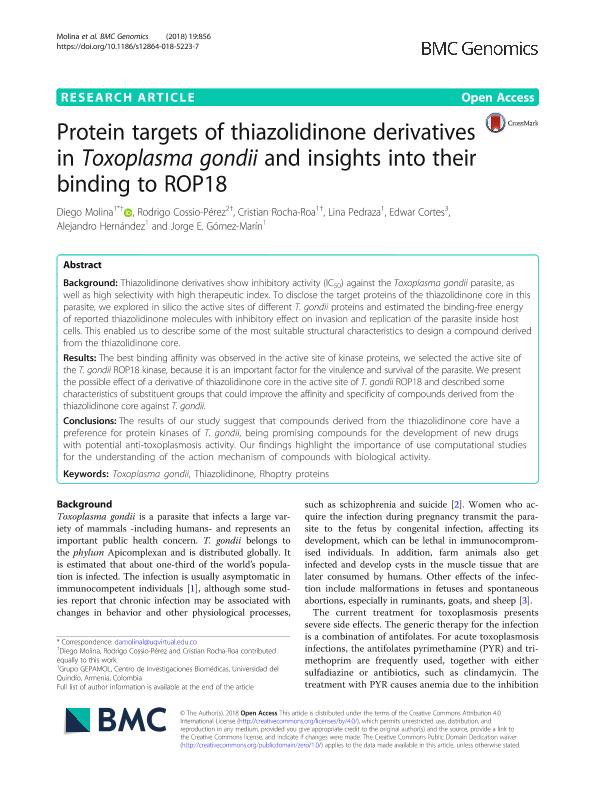Artículo
Protein targets of thiazolidinone derivatives in Toxoplasma gondii and insights into their binding to ROP18 11 Medical and Health Sciences 1108 Medical Microbiology
Molina, Diego; Cossio Pérez, Rodrigo ; Rocha Roa, Cristian Camilo; Pedraza, Lina; Cortes, Edwar; Hernández, Alejandro; Gómez Marín, Jorge E.
; Rocha Roa, Cristian Camilo; Pedraza, Lina; Cortes, Edwar; Hernández, Alejandro; Gómez Marín, Jorge E.
 ; Rocha Roa, Cristian Camilo; Pedraza, Lina; Cortes, Edwar; Hernández, Alejandro; Gómez Marín, Jorge E.
; Rocha Roa, Cristian Camilo; Pedraza, Lina; Cortes, Edwar; Hernández, Alejandro; Gómez Marín, Jorge E.
Fecha de publicación:
11/2018
Editorial:
BioMed Central
Revista:
BMC Genomics
ISSN:
1471-2164
Idioma:
Inglés
Tipo de recurso:
Artículo publicado
Clasificación temática:
Resumen
Background: Thiazolidinone derivatives show inhibitory activity (IC 50 ) against the Toxoplasma gondii parasite, as well as high selectivity with high therapeutic index. To disclose the target proteins of the thiazolidinone core in this parasite, we explored in silico the active sites of different T. gondii proteins and estimated the binding-free energy of reported thiazolidinone molecules with inhibitory effect on invasion and replication of the parasite inside host cells. This enabled us to describe some of the most suitable structural characteristics to design a compound derived from the thiazolidinone core. Results: The best binding affinity was observed in the active site of kinase proteins, we selected the active site of the T. gondii ROP18 kinase, because it is an important factor for the virulence and survival of the parasite. We present the possible effect of a derivative of thiazolidinone core in the active site of T. gondii ROP18 and described some characteristics of substituent groups that could improve the affinity and specificity of compounds derived from the thiazolidinone core against T. gondii. Conclusions: The results of our study suggest that compounds derived from the thiazolidinone core have a preference for protein kinases of T. gondii, being promising compounds for the development of new drugs with potential anti-toxoplasmosis activity. Our findings highlight the importance of use computational studies for the understanding of the action mechanism of compounds with biological activity.
Palabras clave:
RHOPTRY PROTEINS
,
THIAZOLIDINONE
,
TOXOPLASMA GONDII
Archivos asociados
Licencia
Identificadores
Colecciones
Articulos(SEDE CENTRAL)
Articulos de SEDE CENTRAL
Articulos de SEDE CENTRAL
Citación
Molina, Diego; Cossio Pérez, Rodrigo; Rocha Roa, Cristian Camilo; Pedraza, Lina; Cortes, Edwar; et al.; Protein targets of thiazolidinone derivatives in Toxoplasma gondii and insights into their binding to ROP18 11 Medical and Health Sciences 1108 Medical Microbiology; BioMed Central; BMC Genomics; 19; 1; 11-2018; 1-18
Compartir
Altmétricas



